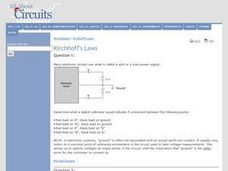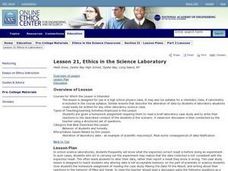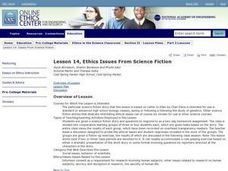Curated OER
Kirchhoff's Laws
In this circuit worksheet students study electronic circuits and how they get power. Students determine polarity and magnitude and work with Kirchoffs laws to answer 48 questions regarding circuits. Answers are revealed when selected.
Curated OER
Flash Flood!
Students study floods and flash floods. The About Floods page explains the difference between floods and flash floods, and why flash floods occur. The Flood Types page explores some of the different types of floods that occur. There is...
Curated OER
Metals or Nonmetals? The Families of Elements
Fourth graders, in groups, compile information on groups of elements. They study Alkali Metals, Alkaline Earth Metals, Halogens, and Noble Gases.
Curated OER
Introduction to Magnets
Students explore magnetism, electromagnetism, and static electricity through a series of activities and experiments. In this magnets lesson, students use magnets to observe the forces of attraction and repulsion between different poles....
Curated OER
Regolith Formation
Learners study what regolith is and how it contrasts with weathering on Earth. In this weathering lesson students divide into groups, hypothesize and confirm their guesses.
Curated OER
The Challenge to Deliver Insulin
Students study the types of diabetes and why insulin is important. In this diabetes lesson students build molecular models and create a healthy lifestyle plan.
National Wildlife Federation
I Speak for the Polar Bears!
Climate change and weather extremes impact every species, but this lesson focuses on how these changes effect polar bears. After learning about the animal, scholars create maps of snow-ice coverage and examine the yearly variability and...
Curated OER
Ethics in the Science Laboratory
Students consider the role of ethics in science lab procedures. In this ethics lesson, students explore a scenario that requires them to record their reactions to the case and the conduct of students in the case who alter laboratory data.
Curated OER
Lesson 2, Student and Teacher Behaviors in Science
Students explore ethics. For this science ethics lesson, students examine science lab classroom ethics as they consider various scenarios that encourage authentic student discussion and the formulation of guidelines and principles.
Curated OER
Ethics Issues From Science Fiction
Students analyze ethics issues as they read science fiction works. In this science and ethics lesson, students read science fiction short stories of their choosing, investigate the ethics issues raised in the stories, and...
Curated OER
Case studies in journalistic ethics No. 1
Students examine the importance and responsibilities of journalists through examination of illegal immigration. In this journalistic ethics instructional activity students analyze scenarios and look at the pros and cons of illegal...
Curated OER
Thinking About Science and the Environment
Students read 3 or 4 Science articles and complete a chart. In this scientific thought concept lesson, students play a game using their chart to reinforce their ideas and concepts. Students make a list of the bigger ideas...
Curated OER
Coastal Threat: A Story in Unit Conversions
Students convert measurements from one unit to another. In this math lesson, students study the environmental consequences of oil spills. They replicate an oil spill event by modeling and scaling.
Curated OER
Fires and Fire Suppression
Learners examine their assumptions about forest fires. They explore the conflicts involved with the forest service's new strategy. in addition, they will study one case where a prescribed natural burn had a significant impact on a later,...
Curated OER
Mammal Teeth and Skulls-Adaptations and Identification
Student study the differentiation of teeth and skull adaptations in mammals in general and 14 common terrestrial mammals. They explore more about these mammals, their natural history, their adaptations and their identification through an...
Curated OER
Contraceptive Options
Students discuss ways to avoid pregnancy. In this contraception options lesson, students can describe various types of contraception option. Students study the case of Rosa and David.
Curated OER
Science: Entomology in Action
Students discover how coroners use insect life cycles to estimate the time of death in cases. they describe how forensic entomologists combine environmental factors with insect life cycles to note the changes. Students examine an...
Curated OER
Science Careers Want Ads
Sixth graders examine the important items that need to be included in a want ad. They create a want ad for a career in science.
Southwestern Medical Center
Field Epidemiology: Investigation of an Unknown Disease
More than 90 percent of the people in a building have come down with an illness, and it is your job to investigate. Teachers give scientists the data needed to decide what is important and how they can solve the mystery....
Judicial Branch of California
Defining Civic Duty and Participation
A lesson, geared toward older elementary scholars, combines art with social studies to explain the purpose of civic duty and how to encourage others in the community to participate. Academics create advertising campaigns to promote civic...
Virginia Department of Education
Determining Absolute Age
How can radioactive decay help date old objects? Learners explore half-life and radioactive decay by conducting an experiment using pennies to represent atoms. Young scientists graph data from the experiment to identify radioactive decay...
University of Kentucky
The Great Spider Debate
Poor, misunderstood spiders! They are feared, disrespected, and detested by many people, yet they do so many positive things. A great addition to any insect unit, learn about some of the more common spiders, while hopefully dispelling...
National Wildlife Federation
Get Your Techno On
Desert regions are hotter for multiple reasons; the lack of vegetation causes the sun's heat to go straight into the surface and the lack of moisture means none of the heat is being transferred into evaporation. This concept, and other...
Curated OER
RISKS AND BENEFITS
Students explore how to assess and weigh the risks and benefits associated with innovations in science and technology.























